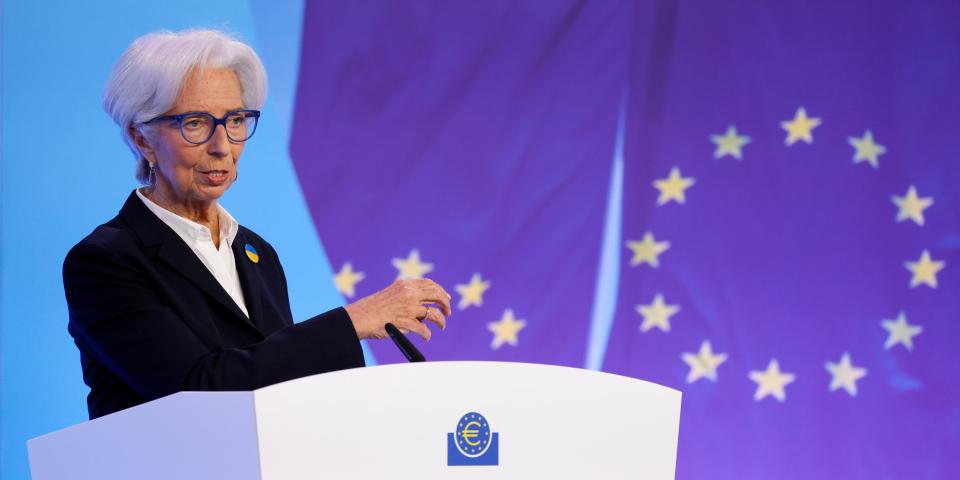The ECB says it's preparing a new anti-crisis tool as a surge in bond yields stirs memories of the eurozone meltdown

The ECB has said it will speed up the creation of a new crisis-fighting tool that is aimed at cooling the pressure on eurozone bond yields.
The emergency meeting came after Italian borrowing costs shot higher in a worrying echo of the eurozone crisis of the early 2010s.
Last week, the ECB pledged to raise interest rates in July but said little about how it would support vulnerable member states.
The European Central Bank said on Wednesday it will speed up the creation of new anti-crisis measures aimed at tackling a surge in eurozone bond yields that has evoked memories of the sovereign debt crisis a decade ago.
After a three-hour emergency meeting, the ECB's governing council said it will "accelerate the completion of the design of a new anti-fragmentation instrument" aimed at cooling the pressure on highly indebted countries' bonds.
In a short statement which was light on detail, the ECB also said it would be flexible in reinvesting the proceeds of bonds maturing from its pandemic-era purchase programme.
The ECB will likely use those proceeds to target the bond yields of more indebted countries, said Claus Vistesen, chief eurozone economist at Pantheon Macroeconomics.
The euro fell slightly after the news. It was last up 0.13% to $1.043, having risen in morning trading after the ECB announced it was holding an emergency meeting to discuss market volatility.
Italian 10-year bond yields rose as some analysts said the ECB's statement was underwhelming. But the yields were nonetheless roughly 35 basis points down on the day at around 3.83%.
The ECB called its meeting after borrowing costs for some of the 19-member eurozone's members shot higher, raising uncomfortable memories of the eurozone crisis of the early 2010s when countries such as Spain, Italy and Greece struggled to pay their debts.
The meeting came less than a week after the ECB held a scheduled vote on monetary policy. At the meeting, the central bank pledged to raise interest rates by 25 basis points in July and strongly hinted at a 50 basis point hike in September. It also said it would end its remaining bond-buying program.
Yields on 10-year Italian government bonds breached 4% for the first time since 2014 earlier this week. The spread between Italian and German 10-year bond yields, seen as a gauge of stress in the eurozone, rose to a high of 2.53 percentage points, its widest level since the onset of the coronavirus pandemic in April 2020.
What is the European Central Bank?
The ECB is the central bank for the 19 European countries that share the euro as a currency. It has been in crisis-fighting mode almost since 2008, when the financial crisis battered economies in the region, sowing the seeds for a sovereign debt crisis in the early 2010s.
The central bank first slashed interest rates into negative territory in 2014, and cut them to a record low of -0.5% in 2019. Meanwhile, its bond-buying programmes have supported the government debt markets across the currency bloc since 2015, holding down borrowing costs.
As a central bank for numerous countries, the ECB faces a difficult task in setting monetary policy to suit very different economies.
Some countries, such as Germany, are major exporters and have relatively low levels of government debt and are seen as reliable borrowers. Others, such as Italy, have high levels of debt, making investors more wary of the country's bonds.
With inflation soaring, the ECB is now preparing to bring the period of highly supportive monetary policy to an end. Investors have become nervous, and have sold the debt of countries such as Italy and Greece, causing their bond yields to shoot up.
The similarities with the early days of the eurozone crisis are uncomfortable. Back then, Greece, Ireland, Portugal, Spain and Cyprus received bailout loans and were forced to turn to strict austerity measures which scarred their economies.
Read the original article on Business Insider

 Yahoo Finance
Yahoo Finance 